Weeding. I know, it seems mundane, but it’s a skill that could mean the difference between a bumper crop and a failed crop in your survival garden. This is really one of those skills you learn best by doing. I can tell you everything I know, but you’ll likely have a different set of weed pressures in your garden, than I do in mine. I’m going to try here today to get some of the basic and general points all in one place, so anyone looking at a new garden, and having trouble figuring out how to do this thing called “weeding” can have a place to start from.
Top of the list for most new gardeners, “How do you tell the difference between the valuable food babies and the baby weeds?” Practice. Yup, there I said it again, get out there and start to learn the difference, it gets easier, I promise. Things that can help you your first couple of years include:
- Good marking of where you seed your food babies.This doesn’t have to be fancy, I use sticks to mark rows, and a page in my journal to map things and mark seeding dates. That way you can be more sure about what you are pulling, anything between the rows, or anything outside of the sticks is a weed and safe to pull. Remember the shape of the leaves of what you are pulling, and anything that is closer to a row and in more question, compare the leaf shape to those that you were 100% sure were weeds and see if that helps.
- Plant the same types of crops for a couple of years and learn what they look like at every stage in development. As you gain familiarity, add a couple more. This way you aren’t overwhelmed with a ton of new babies to learn in one year. Although, there will reach a point where you will be more comfortable with things and you’ll be able to guess what a baby will look like from the seed type and from things it’s related to. You’ll notice this approach doesn’t work if you are planting a survival can of seeds, all of which must go in this year if you are to survive the coming winter.
- Is it coming up in a spot you forgot to water and fertilize? Probably a weed.
- Has it come up in a few days instead of the week and a half your seed packet says? Probably a weed.
- A good plant id site. PennState has a good bit of photographed weeds, organized and online. They even have video’s of the weeds, doing what, I don’t know. Check it out! https://plantscience.psu.edu/research/centers/turf/extension/plant-id/broadleaf
What’s the best way to get the weeds out? Get ’em young. Pluck them out by hand or with some light hoeing, yes, I know how 1800’s. Really, they are so easy when they are young, it’s a 2 finger job. My small hand hoe/3 prong rake works really nicely to clear a row of weeds in the 0-2″ tall range. Anything in the 2-6″ range will need a full sized hoe or some hand pulling. Larger than 6″? Well… if the crop that’s buried under those 6″ weeds is still salvageable, you can carefully pull those weeds out, but you’re likely to damage the crop just from the root systems of the established weeds. Flaming could work, if you have the equipment for it. If there’s doubt about that crop surviving, it may be better to hoe the whole section under and replant something that will mature in the season time you have left. Check out some of my other tool suggestions for food production!
How often should you weed? If you’re getting every row every couple of weeks, things are easy to stay on top of. If weather or other work has kept you from a row for a few weeks, it can take a hoe, or some really tough pulling out by hand. A good soaking can help if you’re pulling by hand. Let the soil get on the dry side if you’ll be hoeing.
Why not just spray it? Are you eating any of the crops? Are your meat animals eating any of it? Then you probably don’t want to be spraying it. I think spray herbicides will be the DDT of our generation, known to our children and grandchildren as a short-sighted and harmful answer to a perennial problem. There will always be weeds. Weeds will eventually adapt to any spray. Just learn how to get them out manually and save yourself the time and cost of herbicides. I can’t prove that you’ll be healthier for it, but I greatly suspect that to be true. Here’s some more on organic pest control, once you’ve got the weeds under control.
Does it have to be 100%? No, especially once the crop in question has gotten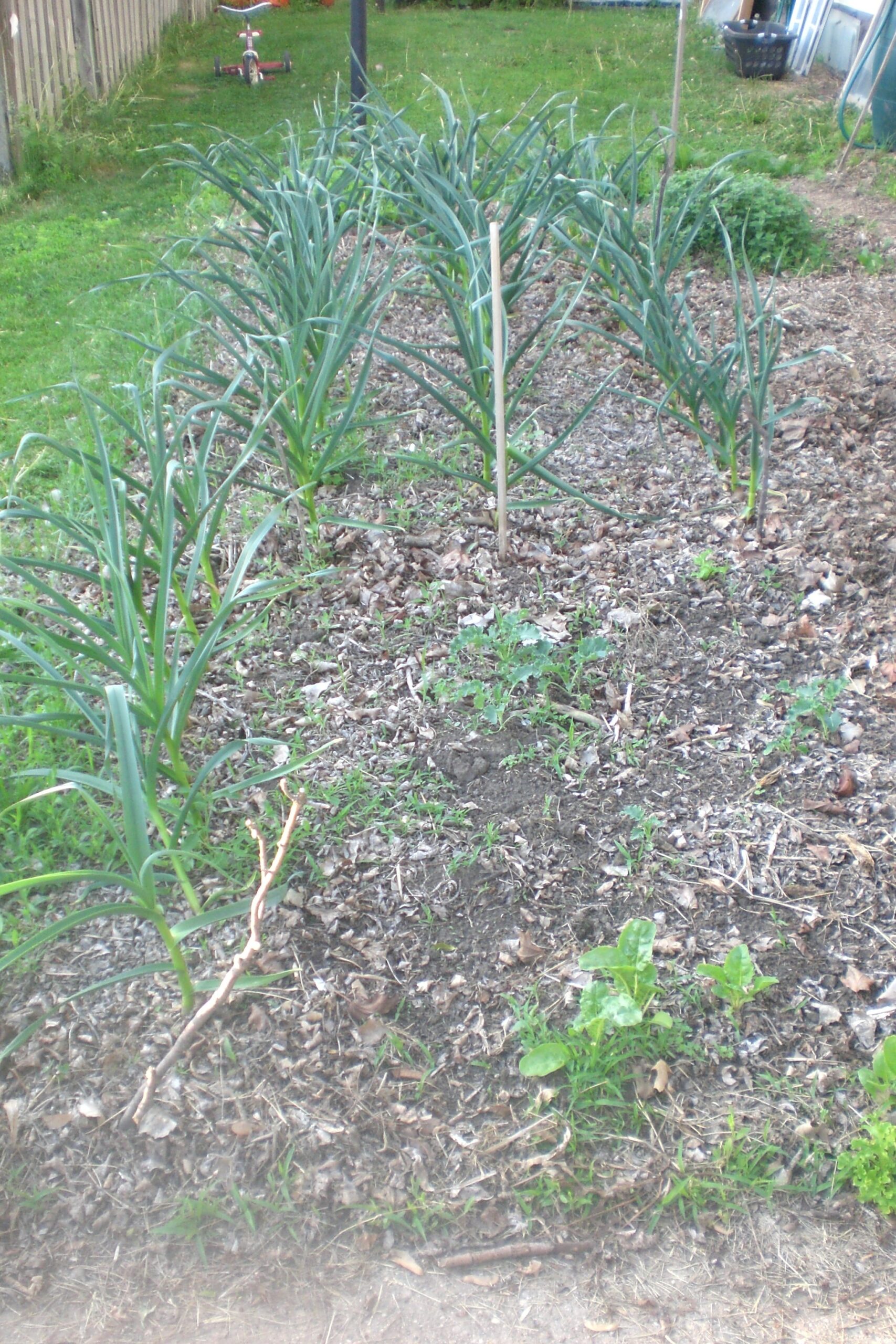 big enough to fend for itself. Here’s a shot of half my garlic crop, last week. At this point I won’t do a lot of weeding to this plot, the garlic is mature, it just needs to finish any bulb development it has left, put up a scape for me to cut off, and then over the next month it will dry and die back. So there’s no purpose to weeding anymore. Nothing will have time to overpower the 20″ high garlic before I harvest and hoe the whole section under.
big enough to fend for itself. Here’s a shot of half my garlic crop, last week. At this point I won’t do a lot of weeding to this plot, the garlic is mature, it just needs to finish any bulb development it has left, put up a scape for me to cut off, and then over the next month it will dry and die back. So there’s no purpose to weeding anymore. Nothing will have time to overpower the 20″ high garlic before I harvest and hoe the whole section under.
Check out some of these before and after shots for how I weed. You can see the baby grass and dandelions in the BEFORE pic on the left.
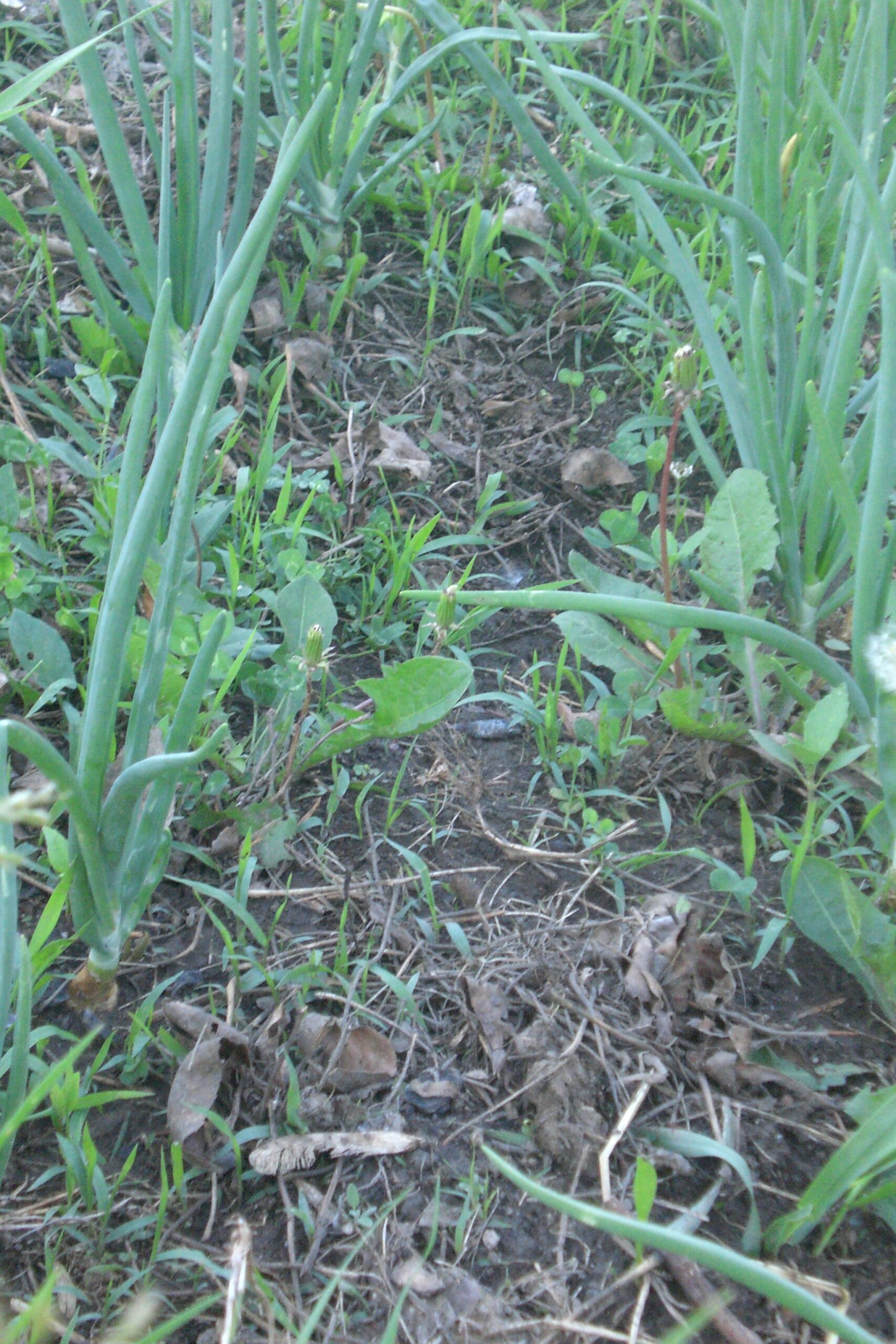
BEFORE
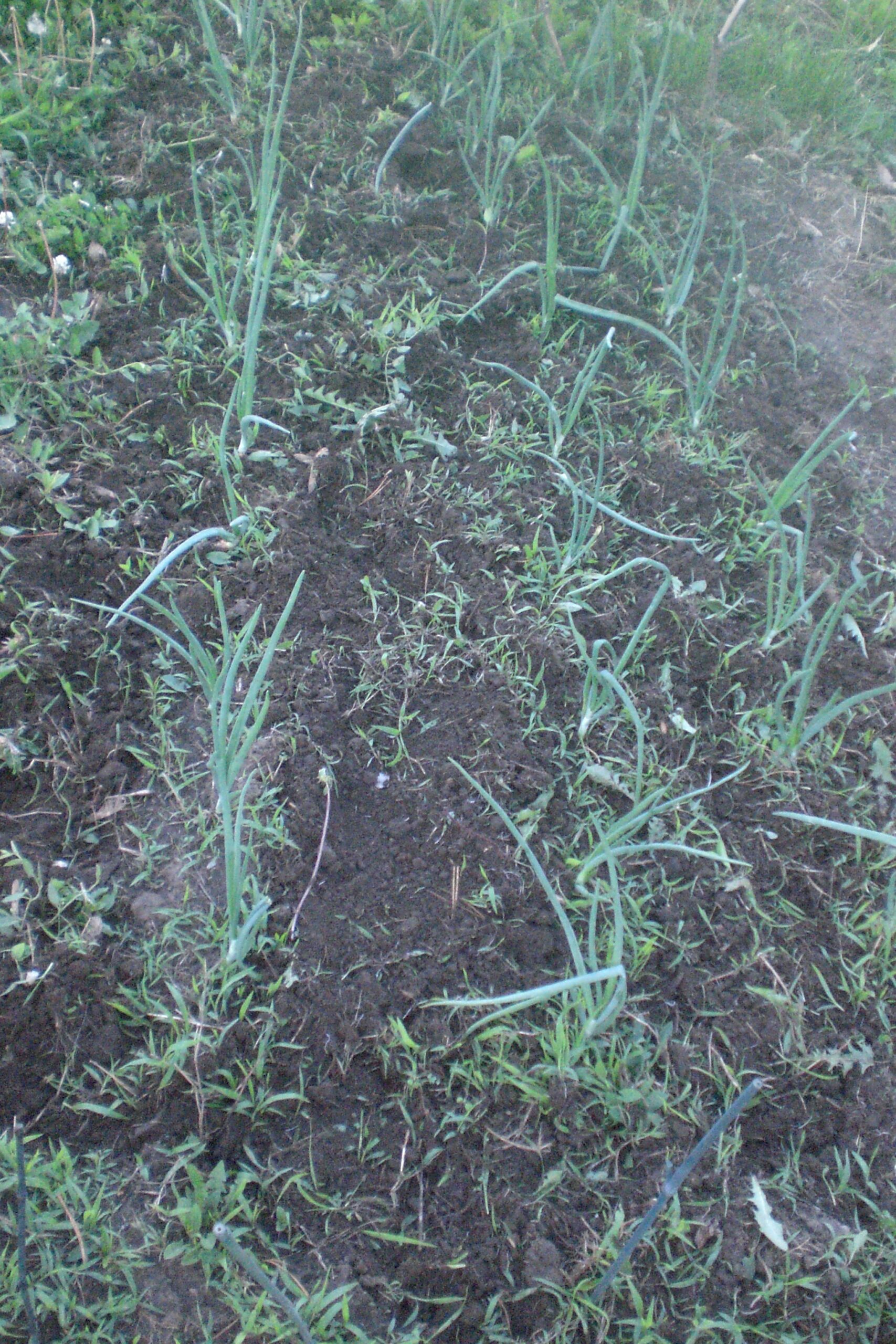
AFTER
In the after picture, you can still see some green from weeds, but most of those are uprooted and just laying on top of the soil where they’ll whither and die. Some are inside the onion row and difficult to remove without damaging the onions. This is another time when less than 100% is ok, don’t damage delicate root systems just to achieve 100% weed removal. Remember, there will always be more weeds.
In the BEFORE shot below left, these are potatoes that I had started to hill/weed before realizing I should take a before shot. So look at the lower left section for a true before look. You can see the weeds in the 0-3″ range. Hilling the potatoes every couple of weeks helps me stay on top of the weeds, it’s a kill 2 birds with one stone maneuver.
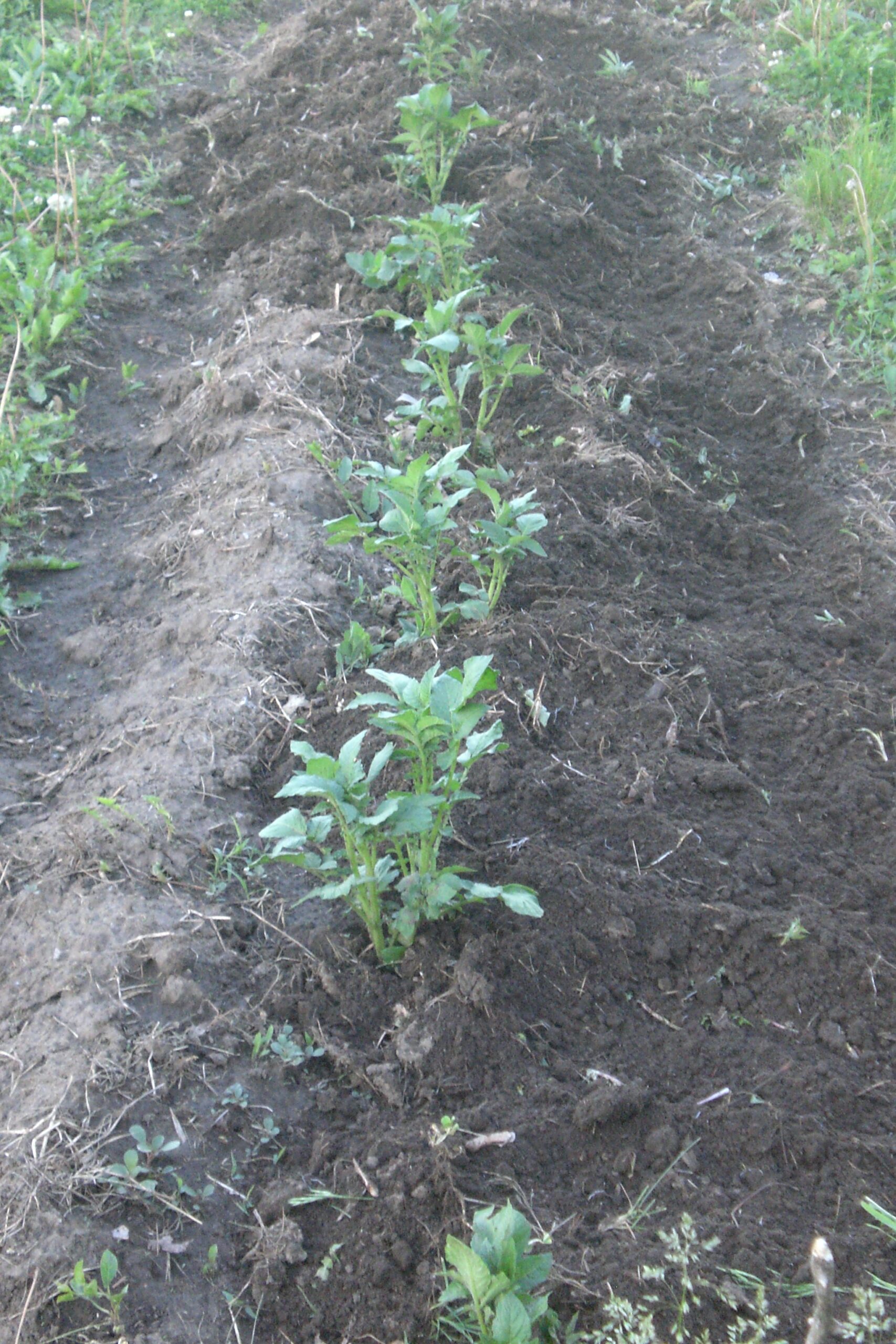
BEFORE
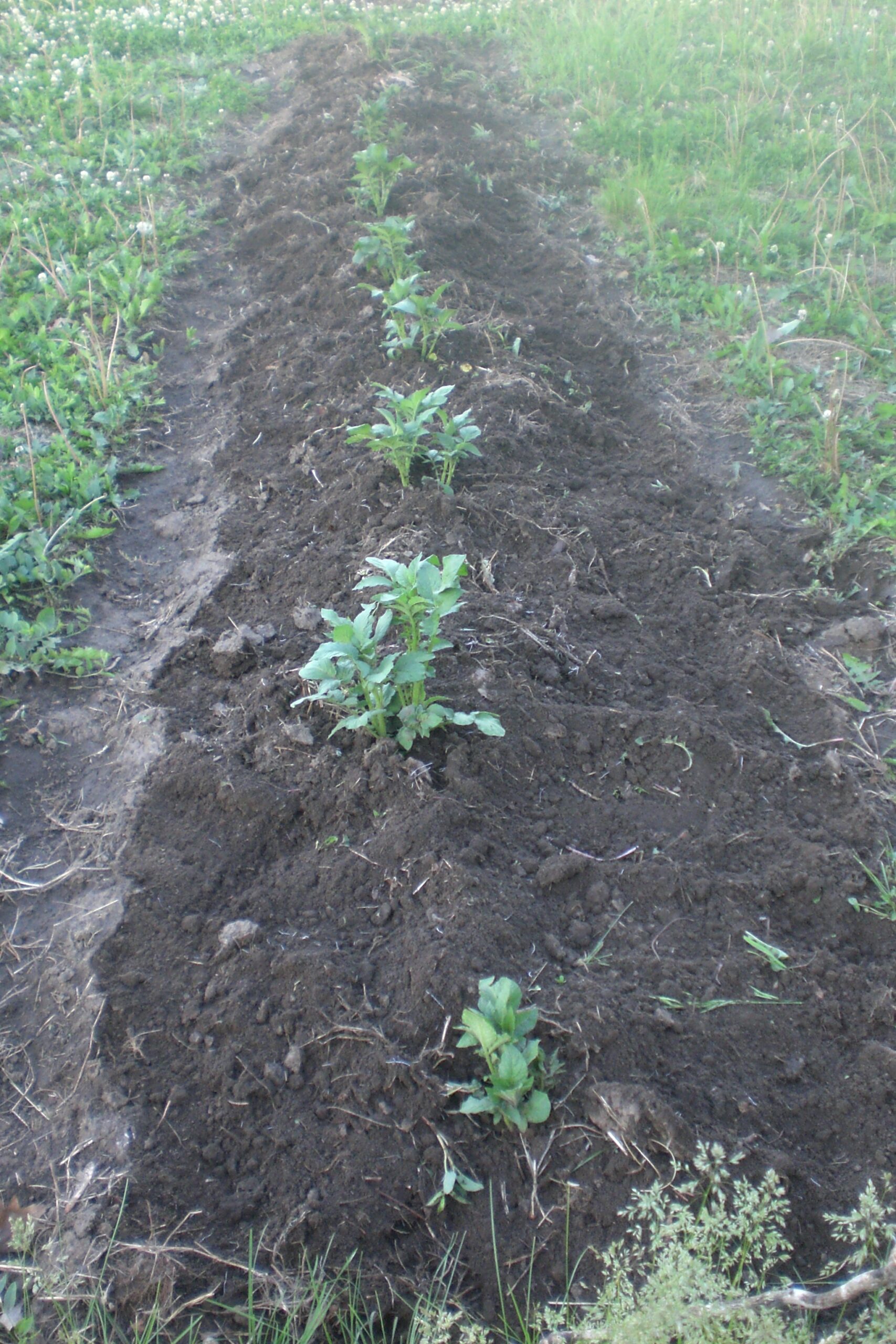
AFTER
Mulch is also part of my strategy, I’ll weed the row then cover it good with some mulch, if the plants are large enough to see over it. Potatoes and Tomatoes are the ones I do this the most with. They have long seasons,
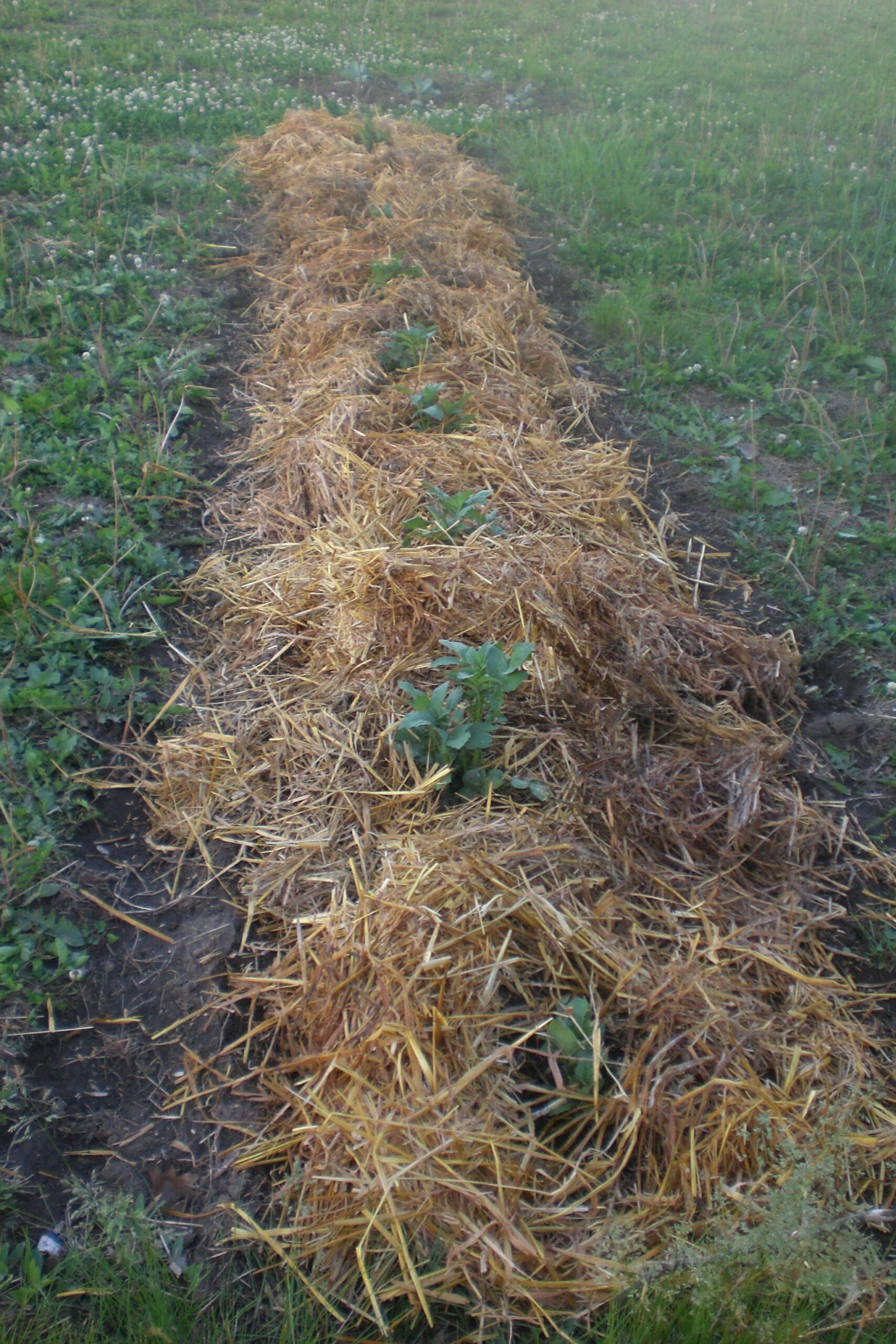
MULCH
so it’s worth the time and cost to mulch, plus they do better if they have more consistent levels of moisture at their roots. And they are big enough to see over the 6″ of mulch. And Iowa generally doesn’t have a slug problem, which can be exacerbated by mulching.
Here’s the final shot of the potato row mulch, after I had hilled it with dirt. This is only the first hilling, I usually do at least 2.
Hope this helps. Do you have specific questions? Email me a picture if you need identification help. Or sound out in the comments!
- Jennie Erwin

10 comments
Hey Calamity,
What are some good things to use as mulch? I’m replanting my balcony garden and thinking about using mulch in the planters, the local birds like to leave grass seed in my plants (the wife likes the annoying birds so they are here to stay), so I thought mulch might help to discourage the growth of those grass seeds.
Leaves, straw, work best for me, but even wood chips and newspaper can work.
CJ,
I’m growing potatoes in garbage cans for the 1st time. I’ve read as the plant grows to burry some of the stalk in soil or straw until the cans eventually full to the top.
Can I use oak leafs opposed to straw? I was advised they might be to acid for the potatoes to grow in? To error on the side of caution I went with straw.
What’s your thought on oak leafs?
I can find references to that problem online. But I don’t have oak leaves myself, so I can’t say I have experience with that one.
That said, there’s more than one question buried in there, are oak leaves acidic? Yes, I think so. Do potatoes care? Everything I can find says potatoes like it acidic. So I would say go for it!
Thanks.
Pierce,
I use leafs to cover my garlic to cut the weeds down. It’s worked very well for me thus far. Price is right too.
I wonder, do the Penn State weed videos go into any detail regarding which of the weeds are harmful to livestock or humans?
I’d rather eat/feed the edibles to livestock, once they’re pulled out…
2 words: FLAME WEEDING. For $30 tool @ Harbor Freight and a tank of propane, you can save yourself HOURS of labor…and make no mistake, weeds can KILL your garden! Anything under 4″ gets touched by the flame, the water in their leaves just boils off – cooked in the ground.
Also, once your plants are established, you can go 2-4″ away from them and they won’t be harmed…then you just have to hand pull the ones that are really close.
You can also use the flame tool to sterilize freshly turned-over ground to kill all the newly exposed seeds.
After spending 1-2 hours per day weeding 1 row per day for the last 2 summers, I now do several rows in an hour. Also consider that weeds will be growing between the rows, and that’s more labor to keep them in check – just flame those areas as well and problem solved.
If your plan includes growing your own food (and how can it not) you owe it to yourself to try this.
I’m a OCD puller. I like to get the root system out and rotting up top.
https://www.eattheweeds.com/pines-not-just-for-breakfast-anymore-2/
With a failing economy and all the water shortages get creative. The just throw money at it and make more debt plan has eliminated breakfast unless you are in jail. Now thanks to poor finance your home is your debt prison. You’ll acquire a taste for weeds. This is like Ireland-minus taters and beef. They all got a beef and are sitting on it. Stock up on wine before the California collapse, formerly know as the harvest. The state has turned abundance into shortages and lines for everything. We saved Iraq!